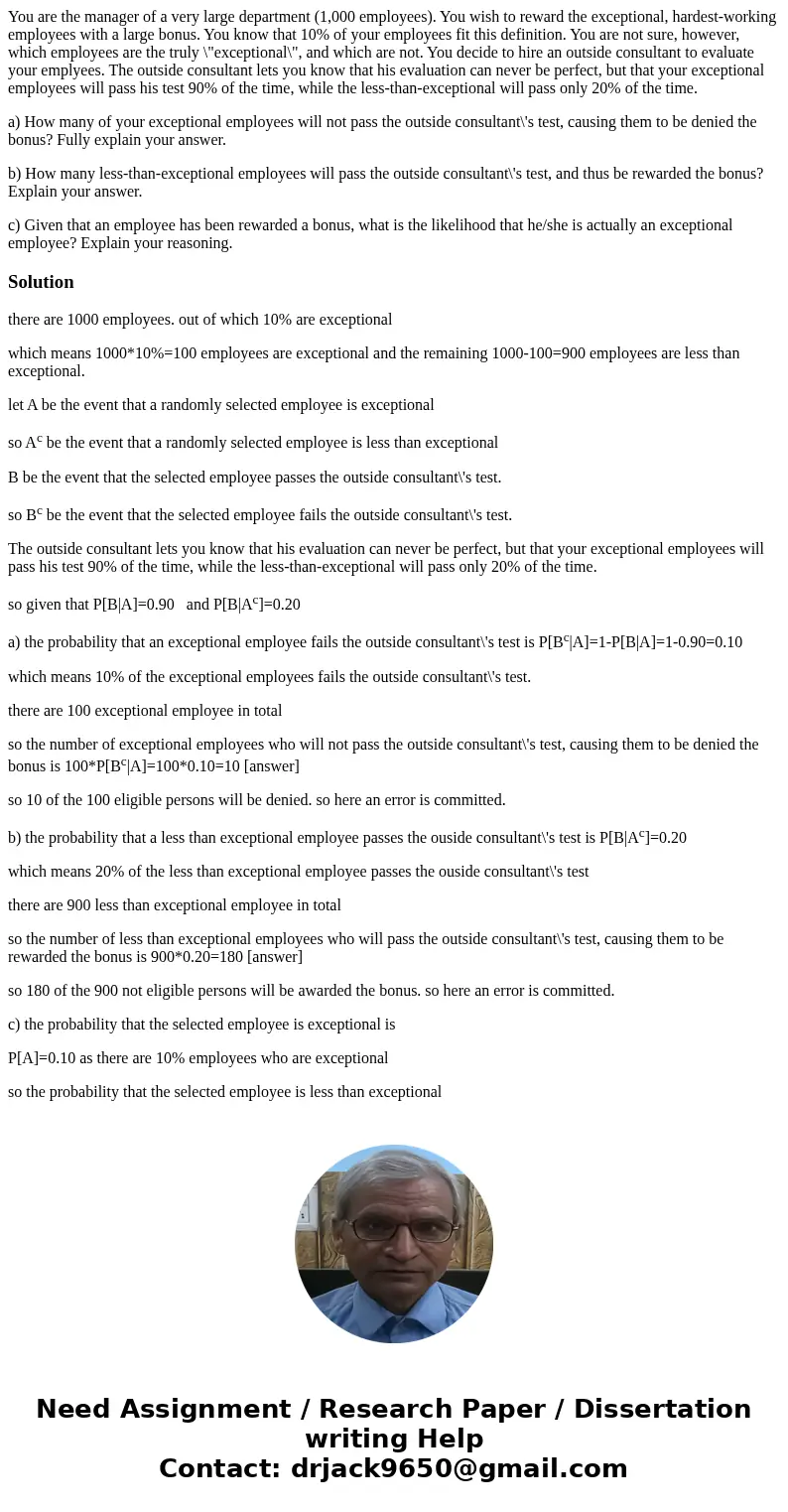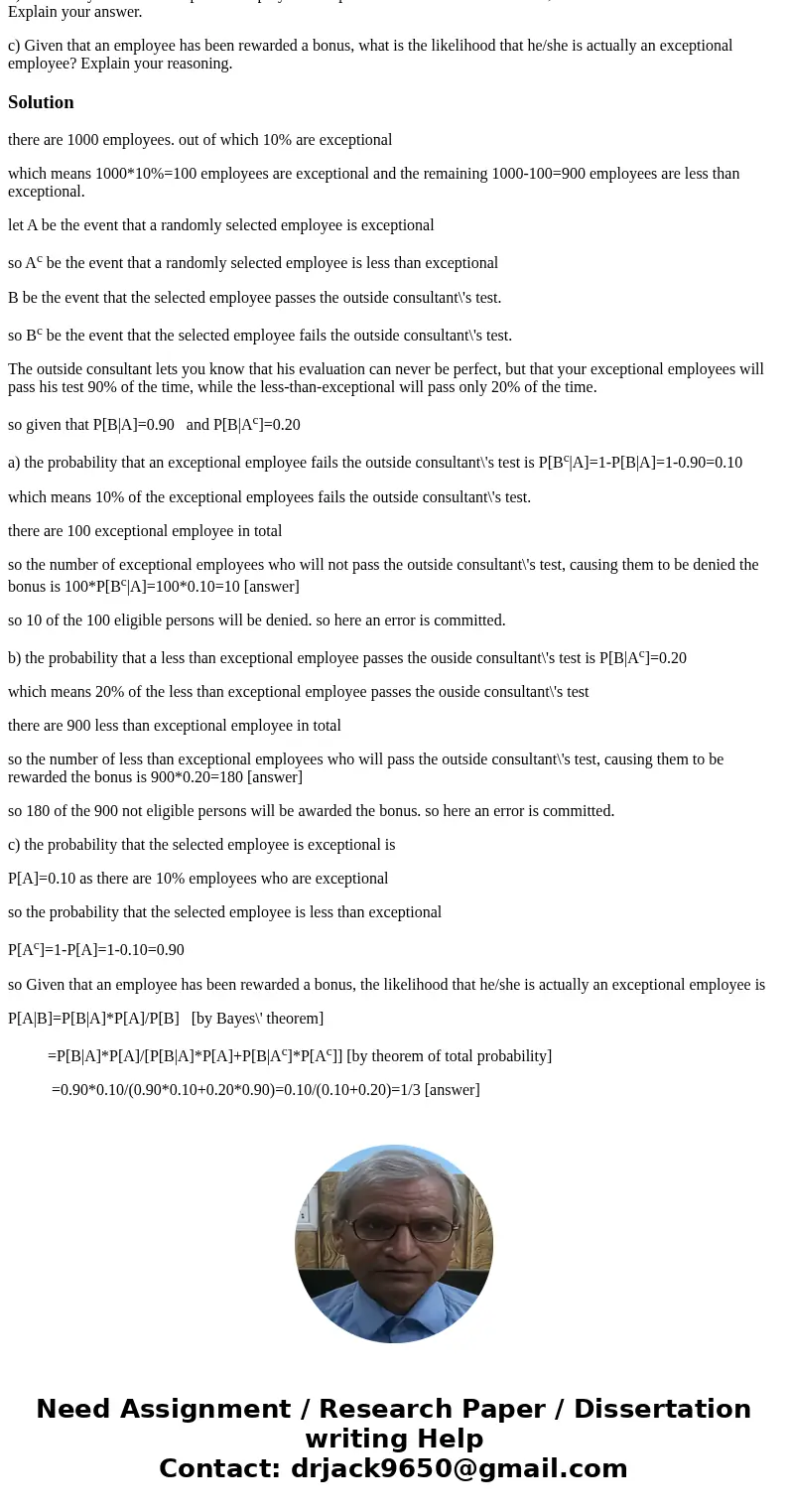You are the manager of a very large department 1000 employee
You are the manager of a very large department (1,000 employees). You wish to reward the exceptional, hardest-working employees with a large bonus. You know that 10% of your employees fit this definition. You are not sure, however, which employees are the truly \"exceptional\", and which are not. You decide to hire an outside consultant to evaluate your emplyees. The outside consultant lets you know that his evaluation can never be perfect, but that your exceptional employees will pass his test 90% of the time, while the less-than-exceptional will pass only 20% of the time.
a) How many of your exceptional employees will not pass the outside consultant\'s test, causing them to be denied the bonus? Fully explain your answer.
b) How many less-than-exceptional employees will pass the outside consultant\'s test, and thus be rewarded the bonus? Explain your answer.
c) Given that an employee has been rewarded a bonus, what is the likelihood that he/she is actually an exceptional employee? Explain your reasoning.
Solution
there are 1000 employees. out of which 10% are exceptional
which means 1000*10%=100 employees are exceptional and the remaining 1000-100=900 employees are less than exceptional.
let A be the event that a randomly selected employee is exceptional
so Ac be the event that a randomly selected employee is less than exceptional
B be the event that the selected employee passes the outside consultant\'s test.
so Bc be the event that the selected employee fails the outside consultant\'s test.
The outside consultant lets you know that his evaluation can never be perfect, but that your exceptional employees will pass his test 90% of the time, while the less-than-exceptional will pass only 20% of the time.
so given that P[B|A]=0.90 and P[B|Ac]=0.20
a) the probability that an exceptional employee fails the outside consultant\'s test is P[Bc|A]=1-P[B|A]=1-0.90=0.10
which means 10% of the exceptional employees fails the outside consultant\'s test.
there are 100 exceptional employee in total
so the number of exceptional employees who will not pass the outside consultant\'s test, causing them to be denied the bonus is 100*P[Bc|A]=100*0.10=10 [answer]
so 10 of the 100 eligible persons will be denied. so here an error is committed.
b) the probability that a less than exceptional employee passes the ouside consultant\'s test is P[B|Ac]=0.20
which means 20% of the less than exceptional employee passes the ouside consultant\'s test
there are 900 less than exceptional employee in total
so the number of less than exceptional employees who will pass the outside consultant\'s test, causing them to be rewarded the bonus is 900*0.20=180 [answer]
so 180 of the 900 not eligible persons will be awarded the bonus. so here an error is committed.
c) the probability that the selected employee is exceptional is
P[A]=0.10 as there are 10% employees who are exceptional
so the probability that the selected employee is less than exceptional
P[Ac]=1-P[A]=1-0.10=0.90
so Given that an employee has been rewarded a bonus, the likelihood that he/she is actually an exceptional employee is
P[A|B]=P[B|A]*P[A]/P[B] [by Bayes\' theorem]
=P[B|A]*P[A]/[P[B|A]*P[A]+P[B|Ac]*P[Ac]] [by theorem of total probability]
=0.90*0.10/(0.90*0.10+0.20*0.90)=0.10/(0.10+0.20)=1/3 [answer]


 Homework Sourse
Homework Sourse